Establishment of “Basic Income for Nature & Climate”: Interview with the team’s coordinator
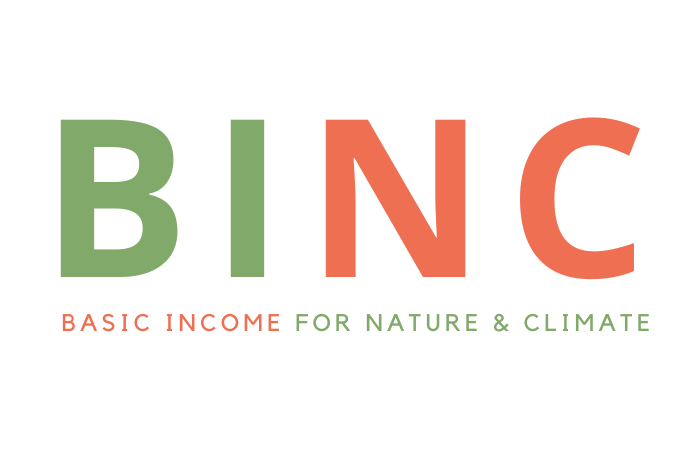

In May 2022, Bernhard Neumärker gave two lectures addressing the potential of basic income in the climate crisis. His May 19 lecture was at the invitation of Students for Future Freiburg and was entitled “Climate Justice and New Ordoliberalism: The Case for Social Sustainability and Basic Income”. In his lecture, Prof. Neumärker shows how climate bonus systems can be designed as a partial basic climate income. He also demonstrates the extent to which net offset systems between CO₂ tax and basic climate income are ecologically and socially disadvantageous in terms of ecological visibility and incentivization when compared to a gross system with separate tax and transfer design. T, based on a German paper on Carbon Pricing and Social Inequality in Germany, he demonstrated that by having a per capita equal repayment of the CO₂ tax, one not only promotes fair redistribution and inequality reduction, but also achieves a higher socio-environmental target efficiency than with the usual means-tested social transfers. Watch this talk on our YouTube-Kanal.
On May 26, Prof. Neumärker gave a keynote speech at the 40th International Energy Workshop at the Konzerthaus in Freiburg. In his lecture “Decarbonization regulation by a tax-transfer system: The Carbon Tax – Climate Basic Income (CaTaBi) Scheme”, he presented his gross tax-transfer system “CaTaBi”, focusing on his governance approach of the so called “New Ordoliberalism”. Among other things, he showed to what extent only CaTaBi is politically strategy proof, while other uses of tax revenues always lead to the expectation of strategic manipulation of politics by interest groups (rent-seeking). In the ecosocial context of the climate crisis, one has to resort to ex post governance, which offers sufficient protection against unforeseen contingencies of climate development. Bernhard Neumärker, on the other hand, does not believe that tackling the climate crisis with statistical forecasts or scenarios ex ante is expedient. Instead, he argued for viewing the “environment” in terms of conflict economics and game theory as an adversary of “nature,” which would in fact react unfavorably to humans due to man-made climate and environmental damage.
In light of recent developments, Bernhard Neumärker drew a parallel between the climate crisis and the Ukraine war. Both crises would likewise reveal that “climate protection” and “national defense” as (global) public goods would only be taken seriously and sufficient investments would only be made if “protection” or “defense” were no longer only discussed in the abstract, but protection against an adversary/aggressor (be it “nature” or the Putin regime) was actively sought. The fact that Germany was only prepared to spend 100 billion euros on its military defense in a state of immediate threat clearly illustrated the underlying precautionary principle.
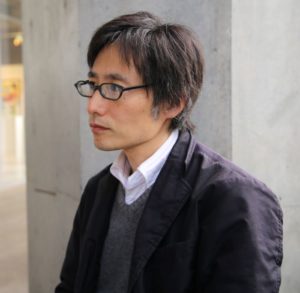
Foto: Enno Schmidt
In his new paper: “Is a Penny a Month a Basic Income? A Historiography of the Concept of a Threshold in Basic Income“, Prof. Toru Yamamori examines the definition of Universal Basic Income under the question of a threshold. Based on its basic pillars: unconditionality, individuality, and universality, he discusses the advantages and disadvantages of a threshold and gives a historical overview of the history and different currents of the demand and definition of a Universal Basic Income. With this paper, he is the winner of the 2021 BIS essay contest in the Journal “Basic Income Studies”.
Without the (re)definition, do we run the risk of calling even one cent a Universal Basic Income when it is paid unconditionally and universally to every individual? What are the reasons and arguments for successively removing this threshold from the definitions? Toru Yamamori discusses why and whether we should reintroduce a threshold into the definition of a Universal Basic Income in this paper, which was awarded the prize for the best paper of 2021 by the journal Basic Income Studies published by De Gruyter Verlag.
The question of the definition of Universal Basic Income is a central theme of the FRIBIS UBI & Gender team, which explores the pillars of definition: universality, unconditionality and individuality from an intersectional feminist perspective. With his historical analysis of the meaning of a threshold, Toru Yamamori has created a starting point for further reflections on the definition of what we call Universal Basic Income from different situations, perspectives and locations, and what this Basic Income means for each of us.
Find the Paper here: https://www.degruyter.com/document/doi/10.1515/bis-2021-0037/html
Jessica Schulz is the team coordinator of the Gender & UBI Team and interviewed Toru with respect to his paper.
How did you come to deal with this question of a threshold in particular?
I’ve known that it was common to define UBI with a threshold in 1980s, and has interpreted the non-threshold definition by BIEN as a result of the difficulty of havin g a consensus on what level the threshold would be. However, by witnessing that some leading advocates condemn the definition with a threshold as ‘flawed’ and deny the existence of what I thought a historical fact, I felt to research this issue seriously.
To what extent is the question of a threshold value related to feminist questions about the unconditional basic income?
In the 1970s and 80s in Europe, there were feminist movements that demanded UBI. All of them defined UBI with a threshold. However, those movements have been almost erased both in UBI communities and feminist academia. There might be a logical connection between the easement of those feminist voices and the denial of (and historical revisionism against) the definition of UBI with a threshold. Also, what I learnt through this historical journey, the concept of UBI is a social construct, and what has been included under the label of UBI is not clear cut. Accepting this plurality of the concept, we could ask the following question: What definition of UBI could feminists embrace?
Prof. Dr. Toru Yamamori is a Professor of Economics at Doshisha University in Kyoto, Japan and Senior Academic Research Editor of BIEN (Basic Income Earth Network). His research includes the philosophical foundations of feminist economics and the oral history of the working class women’s liberation movement that called for unconditional basic income in Britain in the 1970s.
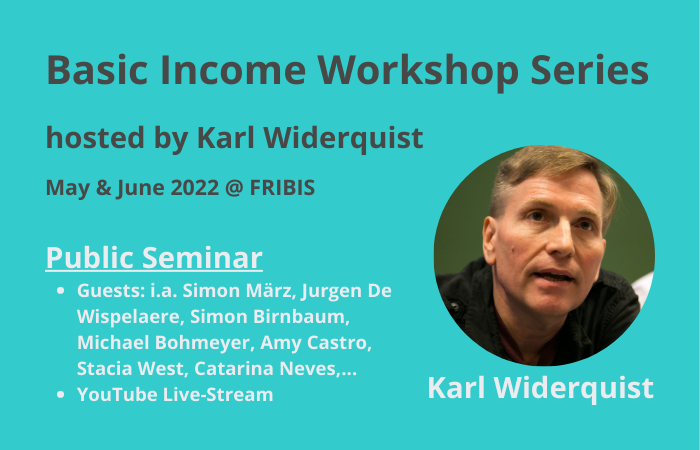
In the summer term 2022 Karl Widerquist was hosting a workshop series that featured lectures by international guest speakers from the field of basic income research. Detailed Information and the Live-Stream-Link you can find below.
Six lectures had been scheduled for May 2022. On May 10, Simon März kicked off the series, followed by Jurgen de Wispelaere & Simon Birnbaum. Michael Bohmeyer, Amy Castro & Stacia West (5-6 pm), continued on May 17. Paul Nieshaus and Jurgen De Wispelaere & Joe Chrisp went for their talks on May 31. On June 21, the last session of this seriet took place with Anna Oostendorp & Johann Gutzmer (4 pm – 5 pm) & Jamie Cooke (5 pm – 6 pm). For more information on the topics and speakers, see below.

“The Effect of Unconditional Cash Transfers on Voting – Evidence from the Finnish Basic Income Experiment”
Anna Oostendorp is a social psychologist working as a scientific analyst for Stiftung Grundeinkommen, a German think tank with an evidence-based approach to exploring the transformation towards more universal social systems. Johann Gutzmer is a social and motivational psychologist working as a policy analyst/expert for Stiftung Grundeinkommen.
Livestream link: https://youtu.be/DlYWCGTJ2D8

“Basic Income in Scotland – Rhetoric and Reality”
Jamie Cooke is the head of RSA Scotland, the Scottish branch of the royal society for arts, manufactures and commerce. In his lecture, he will cover the progress of RSA Scotland around the support for basic income and future steps.
Livestream link: https://youtu.be/DlYWCGTJ2D8

Rewatch in full length: https://youtu.be/kLZbRTeNEuA

Rewatch in full length: https://youtu.be/kLZbRTeNEuA
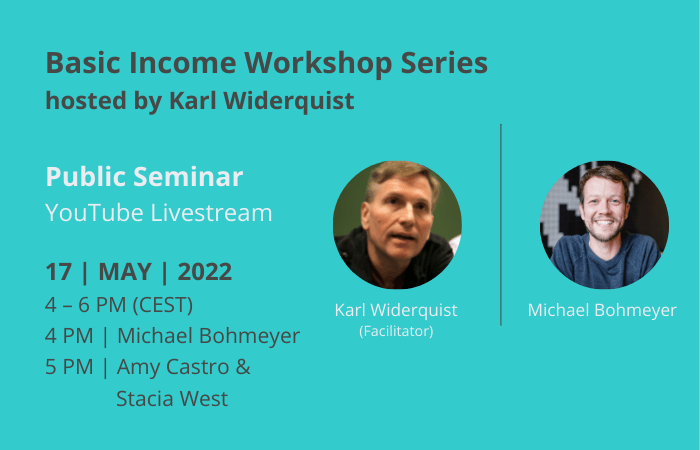
Rewatch in full length: https://youtu.be/KoVI6Kn0x7k
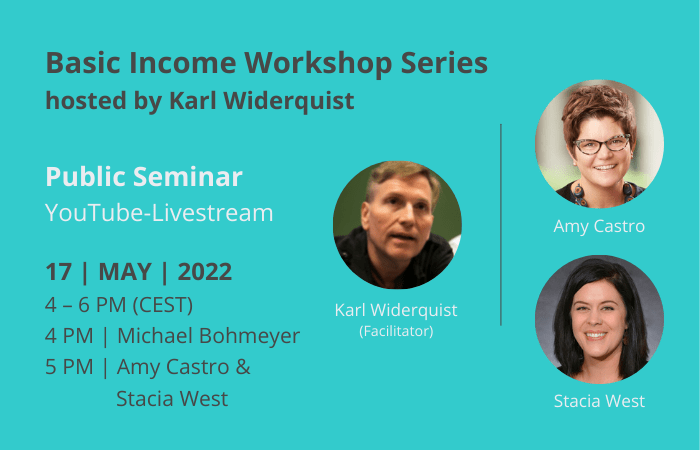
Rewatch in full length: https://youtu.be/KoVI6Kn0x7k
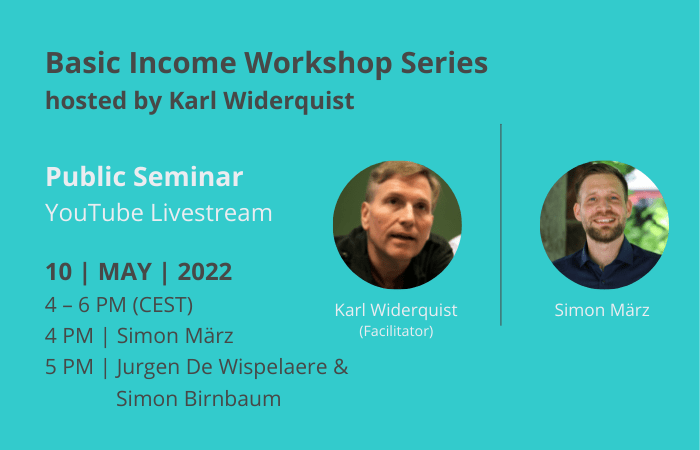
Rewatch in full length: https://youtu.be/FGyXTguJt3s
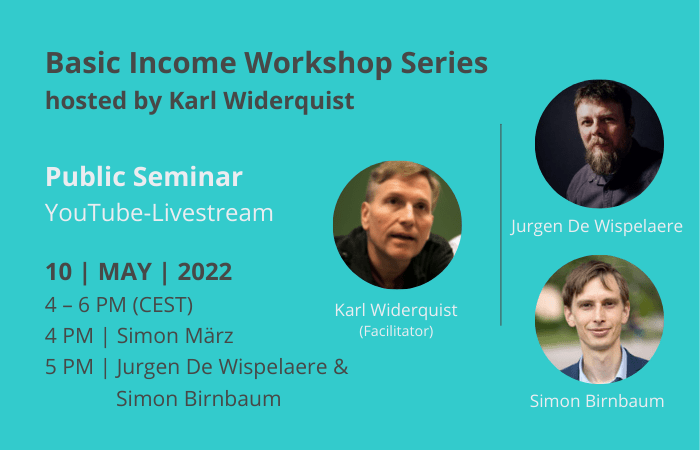
Rewatch in full length: https://youtu.be/FGyXTguJt3s
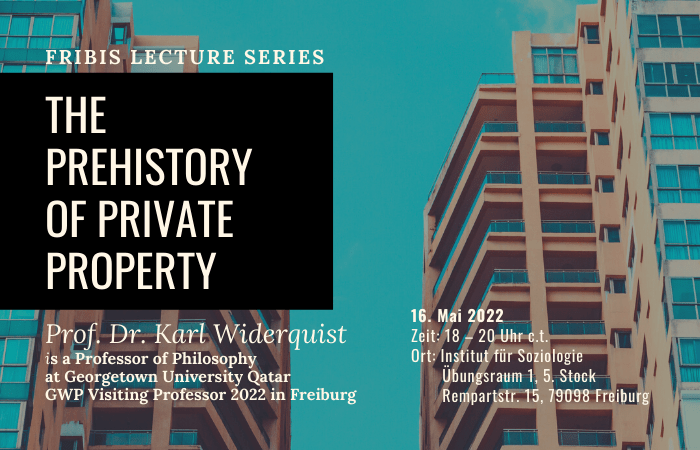
On May 16, 2022, Götz Werner Visiting Professor Karl Widerquist will give a lecture on the prehistory of private property and its implications for modern political theory.
In 2021 he published a monograph on the lecture topic together with Grant S. McCall. This book aims to debunk three false claims commonly accepted by contemporary political philosophers regarding property systems: that inequality is natural, inevitable, or a natural consequence of freedom; that capitalism is more consistent with negative freedom than any other conceivable economic system; and that the normative principles of appropriation and voluntary transfer applied in the world in which we live support a capitalist system with strong, individualist and unequal private property rights.
The authors review the history of the use and importance of these claims in philosophy, and use thorough anthropological and historical evidence to refute them. They show that societies with common-property systems maintaining strong equality and extensive freedom were initially nearly ubiquitous around the world, and that the private property rights system was established through a long series of violent state-sponsored aggressions.
Time: 6 pm – 8 pm
Place: Institut für Soziologie, Rempartstr. 15, 79098 Freiburg, Übungsraum 1, 5. Stock

Michael von der Lohe, member of the FRIBIS team “Partizipation und BGE – ‘Narrative’ der Zukunft“, is again on the road throughout Germany with the Omnibus für Direkte Demokratie from April to November.
From 09-11 May, the initiative will be present on the square of the “Alte Synagoge” and invites on Wednesday, 11 May at 7 pm (Grünhof) to a lecture on the financing of the unconditional basic income and a question and answer session on basic income issues.
Place: Grünhof, Kreativpark Lokhalle, Paul-Ehrlich-Str. 7, 79106 Freiburg
Further information can be found here.
A recent lecture series at the University of Gießen (Winter Semeter 2021/22) took a look at “solutions for a just and more equitable economic order “. The series focused on rethinking the economy to achieve a more sustainable economic future.
Considering the topic, it is not surprising that Prof. Bernhard Neumärker was one of the speakers. As an ardent proponent of a New Ordoliberalism and the concept of social sustainability, Neumärker has been dealing with the feasibility of reforming the current welfare state for years. His Gießen lecture was entitled “Net Basic Income: crisis basic income as an entry point to resilient governance and welfare state reform”.
The Corona pandemic has aggravated already existing economic and social problems. Policies against the spread of the virus lead to a massive decline in earnings. So alongside the health crisis, many people have been plunged into a financial crisis as well. This is where Neumärker’s concept of a net basic income as a crisis basic income comes in. As an introductory model for resilient governance and welfare state reform, it could in the long term be transformed, step by step, into a fully-fledged basic income.
The Gießen lecture is in German, but you can find another lecture on Net Basic Income in English here.
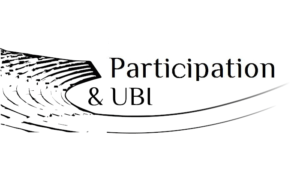
The thesis that a basic income would have a positive impact on people’s participatory opportunities has been repeatedly postulated politically and discussed scientifically for some years now. Christian Greis traces the scientific debate in his sociological monograph “Zur Zukunft eines bedingungslosen Grundeinkommens” (On the Future of an Unconditional Basic Income), published in 2021, back to Ralf Dahrendorf’s reflections on a “guaranteed minimum income” in 1986. In the field of politically engaged art (theory), the entanglement of basic income and direct democracy can be traced back to the 1970s. Compared to the consideration of the UBI from the perspective of the concept of participation, the conceptualisation and research of the UBI as an economic-political ‘narrative’ represents an even more recent phenomenon. This is to be seen in the broader context of a remarkable general boom of the concept of narrative in contemporary Western culture: In various cultural fields such as politics, economics and science, there has been increasing talk of ‘narratives’ since the turn of the millennium. This mostly refers to narratives of the future that are based on crisis scenarios from
which concrete instructions for action in the present can (or should) be derived. The constellation that exists between basic income, (political) participation and future ‘narratives’ will be thoroughly examined for the first time in the planned anthology from both a scientific and an activist perspective. But it will also look at the history and the connection of these concepts to other fields. The volume will be published within the series of the Freiburg Institute of Basic Income Studies (FRIBIS). Contributions on individual links or individual elements of this constellation are also welcome.
Extended Deadline for submission of abstracts (max. 300 words): May 31st, 2022 to leon.hartmann@philosophie.uni-freiburg.de
Weitere Info und Kontakt / Further info and contact:
Leon Hartmann, M.A. – leon.hartmann@philosophie.uni-freiburg.de
FRIBIS Team Participation & UBI
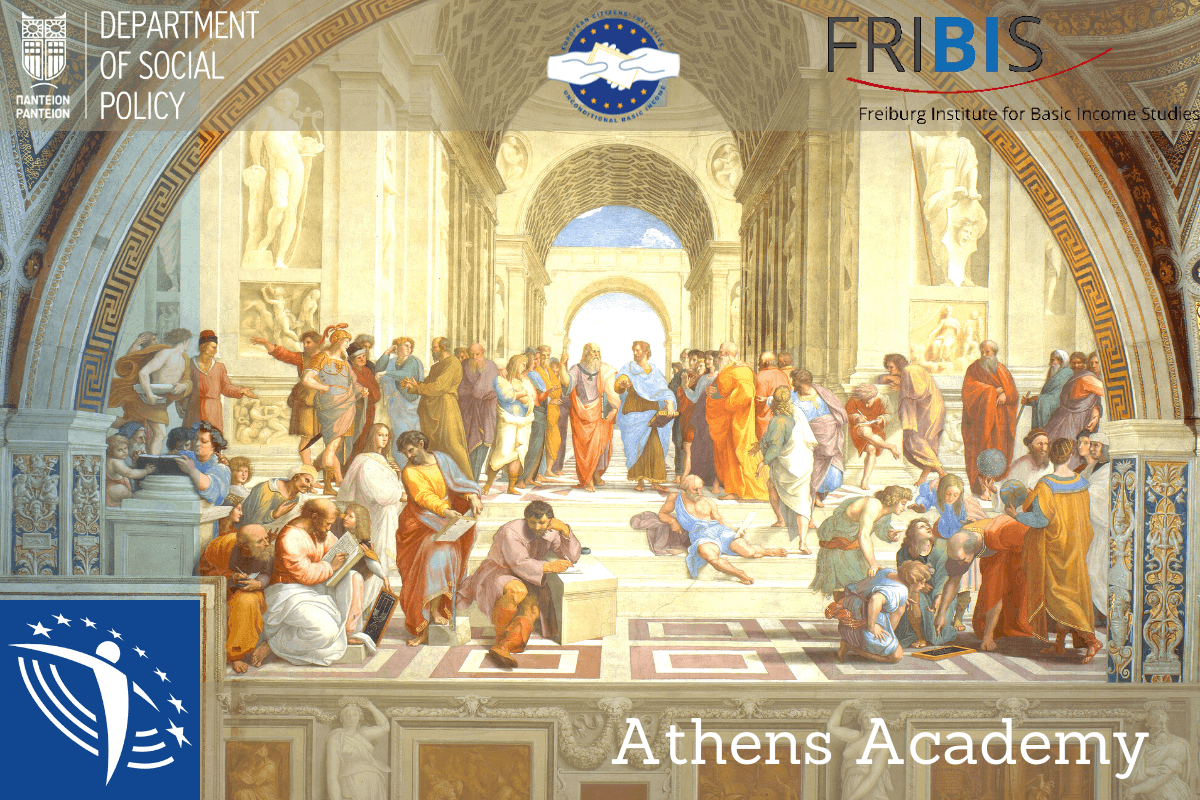
The goal of the UBIE Athens Academy from Thursday 31 March to Sunday 3 April 2022 is to share knowledge, develop campaigns and foster networking around Basic Income in Europe.
UBIE offers a 4 days mix of seminars, workshops and debates around Unconditional Basic Income. For further information, please click here. The event is organized by UBIE in cooperation with Panteion University (Department of Social Policy) in Athens (the oldest University of Social and Political Sciences in Greece) and the European Citizens’ Initiative for Unconditional Basic Income in Greece, supported by the Freiburg Institute for Basic Income Studies (FRIBIS).
This will be a live event. If you only want to follow the evening debates, at the venue or via streaming, you do not need to register in advance. Simply keep an eye on their webpage.
Discussants and contributors at UBIE Athens Academy who are associated with FRIBIS are Claudia Cornelsen (Team Sanctions-Free), Julio Linares (Team NetFi) and Joy Ponader (Team Expedition Grundeinkommen).
After such a long time of Online Events during the pandemic, we hope all the participants in Athens enjoy the in-person experience.
In November and December 2021, philosopher and political economist Otto Lehto came to Freiburg as a FRIBIS visiting scholar. We asked him how basic income research has changed in recent years, what he had gained from his time at FRIBIS and about the research topics he hopes to focus on in the future.
Where does basic income research stand today?
“Basic income research has matured into a diverse, interdisciplinary field. More people than ever are now conducting top-notch qualitative and quantitative research. And valiant efforts are being made to harmonize economic, philosophical, and political considerations with each other. However, the subject tends to attract supporters of UBI more than those are who critical or neutral towards it, so researchers should be wary of motivational bias. There is also an excessive focus on short-lived RCT experiments and other forms of discretionary policymaking that, in my mind, undermines the viability of UBI as a long-term institutional reform of the basic human rights framework.”
What did you gain from your stay at FRIBIS?
“Freiburg is a lovely city. Aside from that, I valued my time at FRIBIS for three main reasons. First, I got to conduct research on Ordoliberalism in its birthplace. Secondly, I got to meet and work with many interesting FRIBIS scholars, including the Junior Research Group, and to conduct a series of in-depth discussions with Enno Schmidt. Thirdly, thanks to a shared passion between myself and Prof. Neumärker’s for J.M. Buchanan, I got to run a workshop on constitutional approaches to UBI, which hopefully will spawn more theoretical and empirical research on constitutional UBI.”
What will be the focus of your future work on UBI?
“There are three strands to my future work on UBI: 1) To study the link between UBI, social change, and “Permissionless Innovation”, i.e. the capacity of (poor) people to experiment and innovate from the bottom up in ways that contribute to adaptation and social flourishing.
2) To explore basic income models within the various schools of liberalism: Freiburg, Virginia, Chicago, and Vienna. 3) To explore the implementation and maintenance challenges faced by constitutional vs. policymaking UBI models in order to achieve and maintain institutional stability in a complex democratic society.”
Otto Lehto in conversation with Enno Schmidt: (Ordo-)Liberalism and Basic Income.
In an interview conducted by Enno Schmidt, Otto Lehto talks about the origins and theoretical foundations of liberalism, the Freiburg tradition of ordoliberalism and the extent to which the UBI is compatible with liberalism from today’s perspective.
Workshop on YouTube: A constitutional and contractarian perspective on Universal Basic Income
In September 2021, Otto Lehto organized a workshop for the members of the FRIBIS’ Junior Research Group, in which he discusses UBI from a constitutional perspective. (Recordings of parts of the workshop are now available on our YouTube channel.) In the first part of the video Otto Lehto talks about the importance of a constitutional and contractarian approach to the welfare state and basic income policy. In the second part, he uses James Buchanan’s constitutionalist UBI model as an example to present a constitutionalist, political economy perspective on the UBI.
We, the members of FRIBIS, would like to heartily thank Otto Lehto for his work at the Institute, from which we learned a lot, and for the wonderful time spent with him. We wish him every success on his further academic path and look forward to welcoming him back soon as a guest in Freiburg.